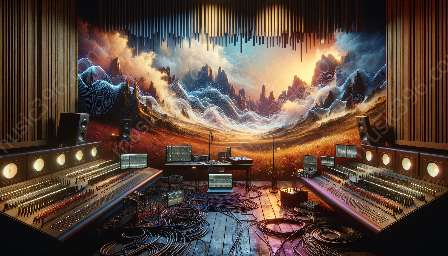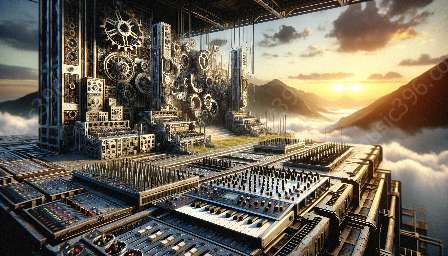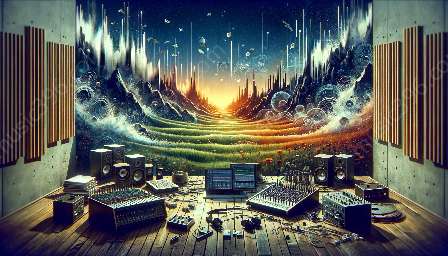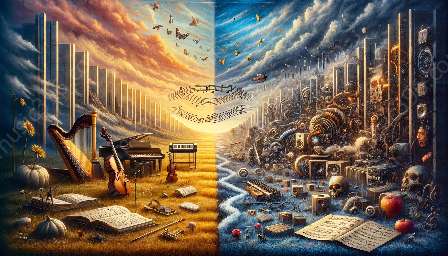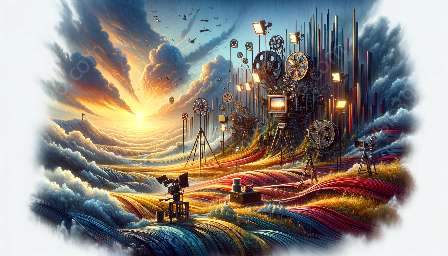When it comes to protecting intellectual properties and rights in experimental music, it's essential to understand the implications of copyright, patents, and trademarks. This topic cluster explores the comparison of these legal mechanisms in the context of experimental music, shedding light on their significance and limitations. Additionally, it delves into the niche of experimental and industrial music, providing insights into the unique challenges and opportunities in this genre.
The Essence of Intellectual Properties and Rights in Experimental Music
Intellectual property (IP) refers to creations of the mind, such as inventions, literary and artistic works, designs, symbols, names, and images used in commerce. In the realm of experimental music, IP rights play a crucial role in safeguarding the creative endeavors of musicians, composers, and sound artists. Understanding the nuances of copyright, patents, and trademarks is vital for maintaining a fair and sustainable environment for artistic expression and innovation.
Copyright in Experimental Music
Copyright is one of the most common forms of protection for intellectual properties in the music industry. It grants the creators of original works exclusive rights to their creations, preventing unauthorized use and reproduction by others. In the context of experimental music, copyright protects compositions, recordings, and performances, allowing artists to control the use and distribution of their innovative sonic expressions. However, copyright protection is not unlimited and has specific limitations, especially in the realm of transformative and avant-garde musical practices.
Patents in Experimental Music
Patents are another type of intellectual property right that may come into play in experimental music, particularly in the context of innovative music technologies and instruments. Unlike copyright, which protects artistic works, patents protect inventions and processes. In experimental music, patents may be relevant for groundbreaking sound manipulation devices, digital audio processing algorithms, or novel musical interfaces. While patents can provide robust protection for technical innovations, they also involve extensive documentation and examination procedures, which may not align seamlessly with the fluid and unconventional nature of experimental music creation.
Trademarks in Experimental Music
Trademarks are symbols, words, or designs that distinguish products or services from others in the market. In the realm of experimental music, trademarks may be utilized for branding musical projects, labels, or events, enhancing the visibility and recognition of unique sonic explorations. However, trademarks primarily safeguard commercial identities and may not directly apply to the creative content of experimental music itself. Nevertheless, they are valuable for establishing and protecting the image and reputation of experimental music entities in the evolving music landscape.
Exploring the World of Experimental and Industrial Music
Experimental and industrial music genres are known for pushing the boundaries of conventional musical norms, embracing unconventional sounds, structures, and performance techniques. Within these avant-garde domains, the need for adequate protection and recognition of artistic contributions is paramount, necessitating a comprehensive understanding of intellectual properties and rights. Additionally, the dynamic and often collaborative nature of experimental music creation poses unique challenges and opportunities, shaping the way IP rights are managed and respected within this vibrant community.
Conclusion
In conclusion, the comparison of copyright, patents, and trademarks in experimental music sheds light on the multifaceted landscape of intellectual properties and rights within this exciting musical realm. While these legal mechanisms provide essential protections and incentives for innovation, their application in experimental music requires careful consideration of the genre's distinctive characteristics and the evolving nature of artistic expression. By navigating the intricacies of IP rights, the experimental music community can foster an environment where creativity and individuality flourish while ensuring fair recognition and compensation for the pioneering sonic explorations that redefine the boundaries of musical artistry.











